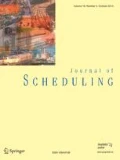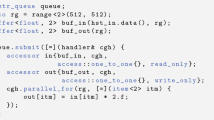Abstract
Guaranteeing the eventual execution of tasks in machines that are prone to unpredictable crashes and restarts may be challenging, but is also of high importance. Things become even more complicated when tasks arrive dynamically and have different computational demands, i.e., processing time (or sizes). In this paper, we focus on the online task scheduling in such systems, considering one machine and at least two different task sizes. More specifically, algorithms are designed for two different task sizes while the complementary bounds hold for any number of task sizes bigger than one. We look at the latency and 1-completed load competitiveness properties of deterministic scheduling algorithms under worst-case scenarios. For this, we assume an adversary, that controls the machine crashes and restarts as well as the task arrivals of the system, including their computational demands. More precisely, we investigate the effect of resource augmentation—in the form of processor speedup—in the machine’s performance, by looking at the two efficiency measures for different speedups. We first identify the threshold of the speedup under which competitiveness cannot be achieved by any deterministic algorithm, and above which there exists some deterministic algorithm that is competitive. We then propose an online algorithm, named \(\gamma \text{-Burst } \), that achieves both latency and 1-completed-load competitiveness when the speedup is over the threshold. This also proves that the threshold identified is also sufficient for competitiveness.




Similar content being viewed by others
References
Adiri, I., Bruno, J., Frostig, E., & Kan, A. H. G. R. (1989). Single machine flow-time scheduling with a single breakdown. Acta Informatica, 26(7), 679–696.
Ajtai, M., Aspnes, J., Dwork, C., & Waarts, O. (1994). A theory of competitive analysis for distributed algorithms. In Proceedings of 35th annual symposium on foundations of computer science, 1994 (pp. 401–411). IEEE.
Anand, S., Garg, N., & Megow, N. (2011). Meeting deadlines: How much speed suffices? In Automata, languages and programming (pp. 232–243). Springer.
Andrews, M., & Zhang, L. (2005). Scheduling over a time-varying user-dependent channel with applications to high-speed wireless data. Journal of the ACM (JACM), 52(5), 809–834.
Anta, A. F., Georgiou, C., Kowalski, D. R., & Zavou, E. (2015a). Competitive analysis of task scheduling algorithms on a fault-prone machine and the impact of resource augmentation. In International workshop on adaptive resource management and scheduling for cloud computing (pp. 1–16). Cham: Springer.
Anta, A. F., Georgiou, C., Kowalski, D. R., & Zavou, E. (2015b). Online parallel scheduling of non-uniform tasks: Trading failures for energy. Theoretical Computer Science, 590, 129–146.
Anta, A. F., Georgiou, C., Kowalski, D. R., Widmer, J., & Zavou, E. (2016). Measuring the impact of adversarial errors on packet scheduling strategies. Journal of Scheduling, 19(2), 135–152.
Armbrust, M., Fox, A., Griffith, R., Joseph, A. D., Katz, R., Konwinski, A., et al. (2010). A view of cloud computing. Communications of the ACM, 53(4), 50–58.
Bansal, N. (2003). Algorithms for flow time scheduling. Ph.D. thesis, IBM.
Boyar, J., & Ellen, F. (2013). Bounds for scheduling jobs on grid processors. In Space-efficient data structures, streams, and algorithms (pp. 12–26). Berlin, Heidelberg: Springer.
Epstein, L., & van Stee, R. (2007). Online bin packing with resource augmentation. Discrete Optimization, 4(34), 322–333.
Georgiou, C., & Kowalski, D. R. (2011). Performing dynamically injected tasks on processes prone to crashes and restarts. In Distributed Computing (pp. 165–180). Springer.
Gharbi, A., & Haouari, M. (2005). Optimal parallel machines scheduling with availability constraints. Discrete Applied Mathematics, 148(1), 63–87.
Jurdzinski, T., Kowalski, D. R., & Lorys, K. (2014). Online packet scheduling under adversarial jamming. In International workshop on approximation and online algorithms (pp. 193–206). Cham: Springer.
Kalyanasundaram, B., & Pruhs, K. (1995). Speed is as powerful as clairvoyance [scheduling problems]. In Proceedings of 36th annual symposium on foundations of computer science, 1995, (pp. 214–221). IEEE.
Pruhs, K., Sgall, J., & Torng, E. (2004). Online scheduling. Online scheduling. In J. Y. T. Leung (Ed.), Handbook of scheduling: Algorithms, models, and performance analysis. CRC Press.
Sanlaville, E., & Schmidt, G. (1998). Machine scheduling with availability constraints. Acta Informatica, 35(9), 795–811.
Sleator, D. D., & Tarjan, R. E. (1985). Amortized efficiency of list update and paging rules. Communications of the ACM, 28(2), 202–208.
van Stee, R. (2002). Online scheduling and bin packing. Ph.D. thesis.
Zhang, Q., Cheng, L., & Boutaba, R. (2010). Cloud computing: State-of-the-art and research challenges. Journal of Internet Services and Applications, 1(1), 7–18.
Acknowledgements
This research was partially supported by the Cloud4BigData grant (S2013/ICE-2894) from Madrid Regional Government (CM), the HyperAdapt project (TEC2014-55713-R) from the Spanish Ministry of Economy and Competitiveness (MINECO), the NSFC project 61520106005 from the National Science Foundation of China, the FPU12/00505 grant from the Spanish Ministry of Education, Culture and Sports (MECD) and the Polish National Science Centre grant DEC-2012/06/M/ST6/00459. We would like to thank the anonymous reviewers for their constructive comments and suggestions to improve our work.
Author information
Authors and Affiliations
Corresponding author
Rights and permissions
About this article
Cite this article
Kowalski, D.R., Wong, P.W.H. & Zavou, E. Fault tolerant scheduling of tasks of two sizes under resource augmentation. J Sched 20, 695–711 (2017). https://doi.org/10.1007/s10951-017-0541-1
Published:
Issue Date:
DOI: https://doi.org/10.1007/s10951-017-0541-1




